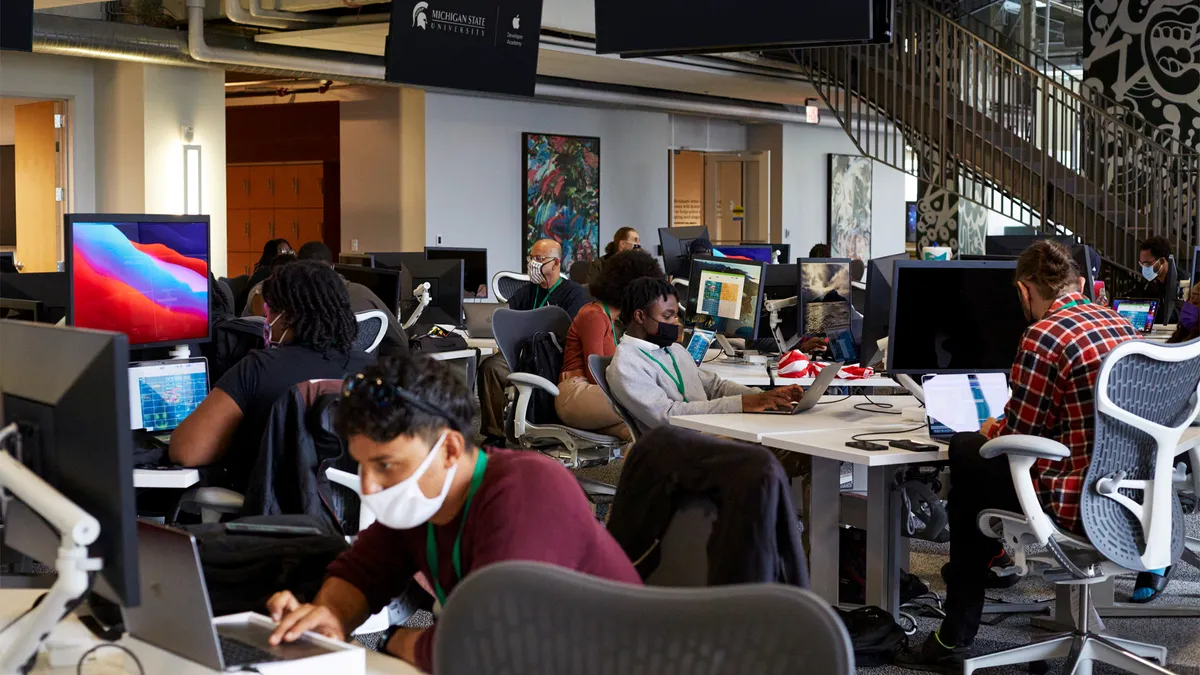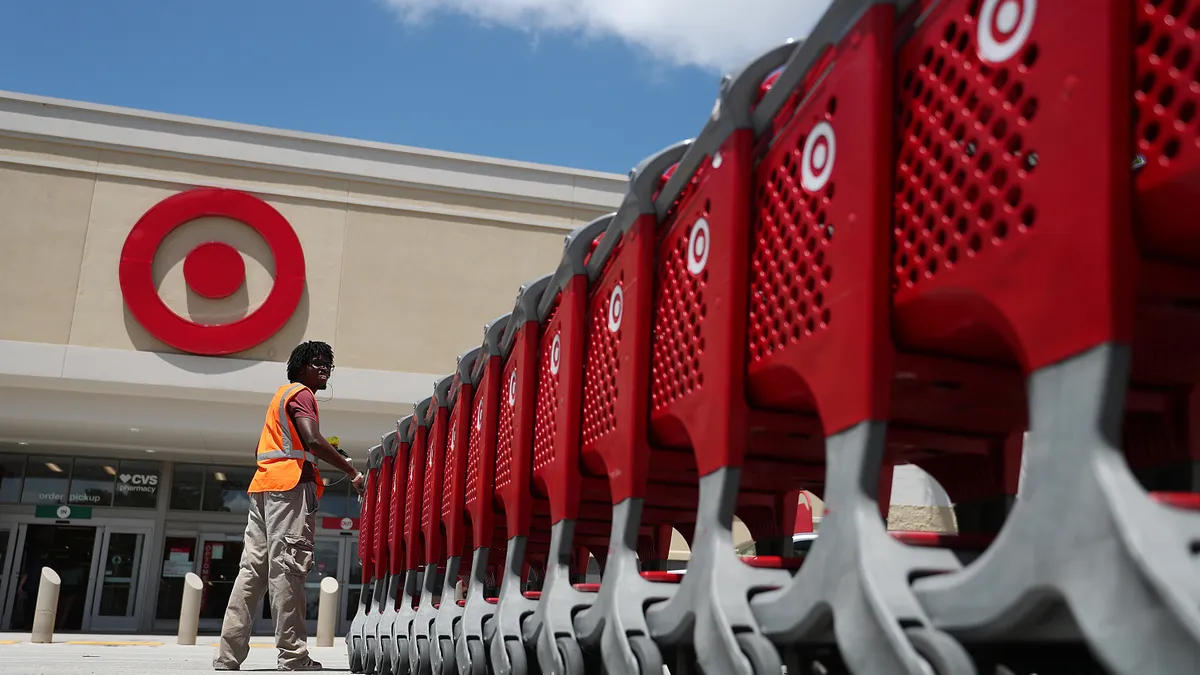After a year of turnover inside and outside of the workplace, calls for employers to show empathy have grown.
HR industry observers have noted the difficulties employers face in facilitating difficult conversations as well as ensuring that employees can deal with the financial and social issues they face — all while also concentrating on their work.
Those topics are familiar to Laila Tarraf, chief people officer at global apparel retailer Allbirds, whose personal experience with loss has informed her approach to work and leadership. In an interview with HR Dive, Tarraf discussed how empathy evolved into becoming an essential leadership trait at work, and how Allbirds has addressed the needs of employees during the pandemic.
Editor's note: This interview has been edited for clarity and brevity.
HR DIVE: What are organizations lacking when it comes to empathy, and why is it so hard for them to sort of embrace that?
Laila Tarraf: We have been evolving as a society, in work, to require qualities like empathy, compassion and collaboration. And now, post-global pandemic, post-Me Too, post-George Floyd, we are dealing with big societal issues alongside whatever our business mandate is. Years ago, we started to say in the human resources field [that you should] bring your whole self to work. Bringing your whole self to work means you bring all of you, not just the employee that adds value in this particular area. You bring your beliefs, your views, your passions, what you struggle with. If we are inviting all of that to work, then we as leaders need to show up in a whole way as well.
That means we need to give instruction and direction, but we also need to pay attention to the context as much as the content. We need to tune into how is this person feeling? Are they enjoying this work? And why do we care about that? We used to say [it was] because you get discretionary effort when there's high engagement. But beyond that, people want to know that you care about them.
Different people have different levels of empathy. I think it is a quality that can be groomed and grown. Two things have to happen: One, you have to create the conditions in which it can thrive. So if you're a culture that models that behavior, if your leaders show they care about people, you're giving a signal to the rest of the organization that it's a caring organization. You can't say empathy is important and then treat people poorly.
The other is to focus on developing your employees in as many of those soft skills, [which] are hard to acquire, as much as [you develop] the hard skills they need. Tasks that used to be manual are now automated. Machine learning and complex algorithms can now do what used to take human brains much, much longer to do. So the real value as humans, individuals and leaders, is collaborating and working together to solve complex problems. This requires emotional and social intelligence skills, influencing skills, persuasion — all of these human skills that we can't emulate in a computer program.
How can you ensure that managers can engage employees in an empathetic way?
Tarraf: The tone of the entire organization is set by the CEO, or the co-founders, in our case. Whether they like it or not, it's important for your CEO to be at the highest level of awareness possible. They set the reality, and if their reality is fear-based, contained and avoidant, the organization will end up reflecting that. If you want an organization that is open, believes in a growth mindset and is psychologically safe, you have to have first [a] CEO [who] embodies that.
"You can't say empathy is important and then treat people poorly."

Laila Tarraf
Chief People Officer, Allbirds
I know that's a very high bar, and we are working on that. Organizations usually struggle with healthy conflict — people struggle with healthy conflict. Either you tend to lean into it too hard, and it can get crunchy and even destructive, or you pull back and [become] avoidant. Usually, you fall on one side or the other depending on your personality or culture. And it's always having to recognize where you are and try to move to the middle to get into a place where you're having healthy conflict that moves you forward.
At Allbirds, people genuinely like each other. And so, sometimes we pull our punches. We don't really give as direct feedback as we should to get the point across because we don't want to be mean, unlikable or hurt someone's feelings. [That's] all coming from good intentions. Last year, I worked with the rest of the leadership team to come up with what I call working agreements. These are rules of the road, operating principles about how we want to engage with each other. What are the promises and commitments [that] we want to make with each other. How do we want to show up and connect? We came up with four.
The first one is to presume positive intent. Then within the conversation, choose courage over comfort, and really say the things that need to be said that might be uncomfortable, but [that] are in the service of the greater good. And as you're leaving the conversation, really focus on aligning, committing and going in a direction. And then the one that holds them all together is practice gratitude every day, because we're so hard on ourselves. You just have to remind yourself to say thank you [and] to be grateful for what is working right and not always focus on what needs to be improved.
2020 brought together workers' personal and professional lives in an unprecedented way. How did empathy play a role in the way Allbirds addressed the needs of employees, particularly those who are parents or caregivers?
Tarraf: Amazingly, productivity has not fallen off. The challenge has been the burnout. Now that everything is all melted together, we have tried to create boundaries and guiding principles of how people should be thinking about their work and their personal lives. We're moving to a much more flexible work arrangement; I don't know any company that's going to go back to exactly the way that it was before COVID.
Individuals have to set boundaries for themselves so that the morning doesn't blend into the evening. We've also, as a company, tried to set boundaries, particularly for our parents. We have said, look, no meetings between 8:00 and 9:00, when parents are trying to get their kids set up for school. Block out your lunch and block out 3:00, because if you don't get the kids after school, they'll be eating cookies until 5:00. We have tried to put in a little bit of structure, boundaries and guidance. There's some that the organization has provided, [but] we need to provide boundaries for ourselves.
We bring in speakers about how important it is to pay attention to self care. We are now working with a telehealth company [and] we actually brought it in and made it free for our employees and their families throughout last year. We're trying to offer support services to continue to enhance well-being.
How do you figure out that balance between emphasizing well-being in your messaging and communication, but also allowing employees to seek out well-being resources on their own?
Tarraf: It is keeping the lines of communication open, developing a relationship based on trust and constant messaging and encouraging individuals to ask for what they need. We have a very young company — I think the average age is 29 or 30 — and they're so capable. But what I notice, at least with people on my team specifically, is unless I'm really paying attention, they could be anxious [or] burning out.
Every time that happens, we go back and we have a conversation, and there's no harm, no foul. Over time, that happens less and less. When you're early in your career, you want to show you've got it, and you don't want to raise your hand and say "this feels heavy." It's incumbent on leaders to be asking all the time. We went to a flexible time off policy and we're always polling reports to make sure people are taking their flexible time.
It is a bit of a push and a pull, and it is a bit of encouraging and a little bit of mandating. Sometimes you over index on the employee, and sometimes you over index on the company. But as long as you stay in that window, I think most of the time you get it pretty right.
Correction: A previous version of this story misspelled Tarraf's name.











![Salesforce AI's CEO sits onstage across from Cristina Criddle. Screens that say Human[X] hang behind them.](https://imgproxy.divecdn.com/J71WpXWHjr8jmbCw_PX7Cp2YH7Pmo8dP66Pz0SEPfw4/g:nowe:0:104/c:1024:578/rs:fill:1200:675:1/Z3M6Ly9kaXZlc2l0ZS1zdG9yYWdlL2RpdmVpbWFnZS9HZXR0eUltYWdlcy0yMjA0NjUxNDM0LmpwZw==.webp)









![Salesforce AI's CEO sits onstage across from Cristina Criddle. Screens that say Human[X] hang behind them.](https://imgproxy.divecdn.com/4XVfO8mNsslv7_axsVip9IU74iKpLWgiY3616VXH4ow/g:nowe:0:104/c:1024:578/rs:fill:600:338:1/Z3M6Ly9kaXZlc2l0ZS1zdG9yYWdlL2RpdmVpbWFnZS9HZXR0eUltYWdlcy0yMjA0NjUxNDM0LmpwZw==.webp)